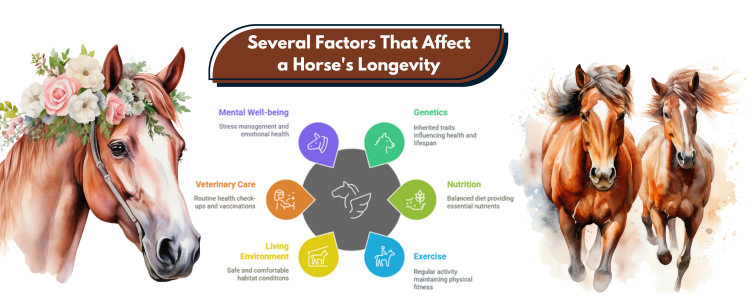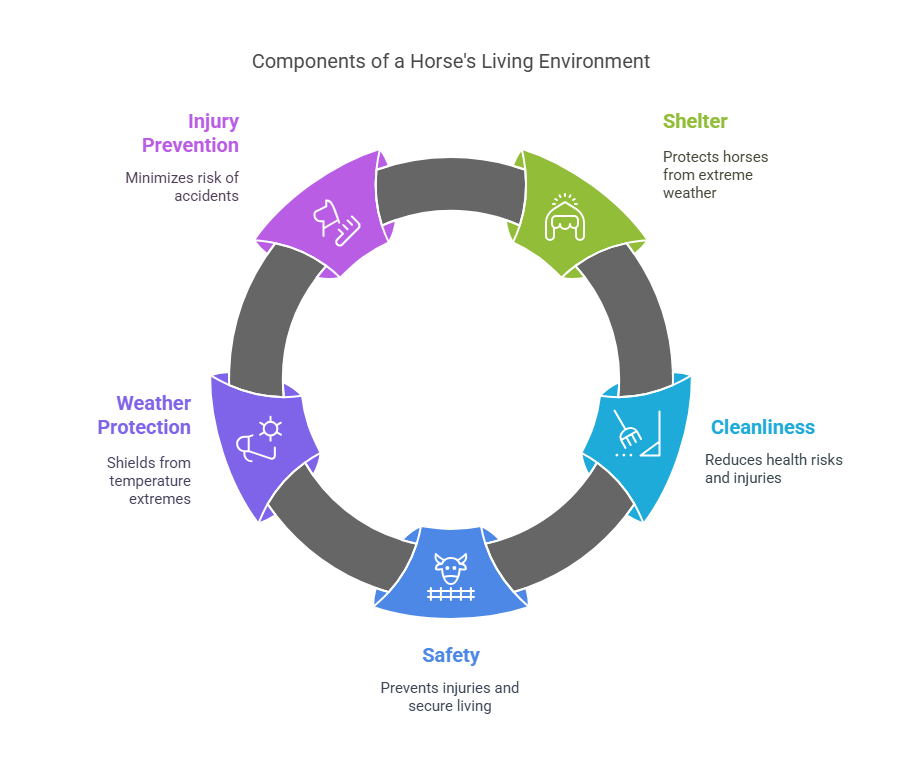Diet quality, access to quality medical care, genetic abnormalities, chronic illnesses or injuries, breed, workload, living environment, and overall health management are Several factors that can affect a horse’s longevity. When you first acquire a horse, you may dream of many years of companionship and success. However, a horse’s longevity doesn’t happen by chance. Several factors influence a horse’s lifespan, including its breed, care regimen, diet, exercise, and living environment. Understanding these elements can help you maximize your horse’s years of good health, performance, and happiness.
The Role of Genetics in Horse Longevity
Like humans, horses inherit traits from their parents. Certain breeds tend to live longer than others. For example, the Arabian horse is well known for its impressive lifespan, often living up to 30 years or more. On the other hand, larger breeds like draft horses may have a shorter lifespan due to physical stress.
Genetics play a significant role in the horse’s general health. Some horses inherit genetic conditions that can shorten their lifespan. In contrast, horses with fewer hereditary health issues tend to live longer. Understanding your horse’s breed and family health history can give you a clearer picture of what to expect.
Nutrition: The Foundation for a Long Life
Diet plays a pivotal role in a horse’s longevity. A balanced diet ensures your horse stays healthy, active, and free from chronic diseases. Horses need a mix of hay, fresh grass, and grain, depending on their age, activity level, and overall health. It’s essential to provide horses with the right balance of nutrients, including protein, fiber, vitamins, and minerals.
High-quality hay is crucial for digestion, while grain should be given in moderation to avoid weight gain and metabolic issues. Fresh water should always be available to ensure proper hydration, especially if the weather is hot or your horse is working hard.
Regularly consulting with a veterinarian or an equine nutritionist ensures your horse receives the right nutrients. A well-balanced diet is crucial in preventing obesity, digestive problems, and metabolic conditions, all of which can shorten a horse’s life.
Exercise: The Key to Strong Bones and Muscles
Exercise is vital to a horse’s overall health and longevity. Regular activity keeps the muscles strong, bones sturdy, and joints flexible. It’s important not to over-exercise, especially in younger horses or those with pre-existing health conditions.
Exercise routines should be adjusted to match your horse’s age, breed, and physical condition. Younger horses benefit from daily exercise, including light to moderate riding or turnout, while older horses might need lower-intensity work to stay in shape without stressing their bodies.
One of the most common causes of a shortened lifespan is joint issues, which arise from overuse or inadequate movement. Joint problems like arthritis are common in older horses, so moderate and controlled exercise can help prevent these issues from becoming severe. It’s always recommended to include some rest periods in the workout schedule to allow your horse to recover.
Living Environment: Keeping Your Horse Safe and Comfortable
Where your horse lives can affect its health and longevity. Horses are naturally outdoor animals, but they need a comfortable and safe living environment to thrive. Whether your horse is kept in a barn or in an open pasture, the space should be clean, secure, and free of hazards.
Good shelter is essential to protect horses from extreme weather conditions, such as heat or cold. In colder climates, horses may need additional blankets or shelter from the wind, while in warmer regions, horses require access to shade and plenty of water.
A clean and safe environment also reduces the risk of injury. Horses can injure themselves by running into objects, tripping, or slipping in poorly maintained areas. Proper fencing is crucial to prevent your horse from wandering off and potentially getting injured or lost.
Regular Veterinary Care and Preventative Measures
Routine checkups with a veterinarian help ensure your horse is healthy and free from diseases. Regular vaccinations, deworming, and dental check-ups are necessary to prevent common health issues.
Catching early signs of illness or injury is critical in managing your horse’s health. Early detection allows for quick treatment, increasing the chances of a full recovery and a longer life. Many health issues, such as colic or lameness, can become severe if left untreated, potentially shortening a horse’s lifespan.
A well-managed healthcare plan will include regular vaccinations, hoof trimming, and dental care. Horses’ hooves need to be trimmed regularly to prevent overgrowth, which can lead to discomfort and movement issues. Equine dental health is also important; horses require periodic dental checks to avoid painful conditions such as sharp points on their teeth.
Mental Well-being: The Hidden Contributor to Horse Longevity
A horse’s mental health is just as important as its physical health. Stress can have a significant impact on a horse’s well-being. Horses that experience chronic stress or anxiety may develop physical symptoms like ulcers or colic, which can lead to a shorter lifespan.
Providing horses with social interaction, regular turnout, and mental stimulation can improve their mental health. Horses are herd animals and thrive in the company of other horses. Isolating a horse can cause emotional stress, which may result in behavioral problems or health issues.
Creating a positive environment where your horse feels safe and content can reduce stress levels. This contributes to both physical and emotional health, ultimately increasing the chances of a longer, happier life.
Weight Management: Avoiding Obesity and Related Health Issues
Obesity is one of the leading causes of health problems in horses. Horses that are overweight are at a higher risk of developing conditions like insulin resistance, laminitis, and arthritis. Managing your horse’s weight through proper diet and exercise is crucial to preventing these problems.
Ensure your horse is getting the right amount of food based on its age, breed, and activity level. Horses that are overfed or given too much grain can easily become overweight, while horses that don’t receive enough food can suffer from malnutrition.
Consulting with a veterinarian about your horse’s ideal weight and dietary plan can help you avoid these risks and ensure your horse enjoys a long and healthy life.
A Strong Bond: The Impact of Owner Care
A loving, attentive relationship between a horse and its owner can play a crucial role in the animal’s longevity. Horses are sensitive creatures that form deep bonds with their caretakers. Horses that are treated with respect, patience, and kindness tend to be healthier and more relaxed.
Establishing trust and communication with your horse can result in a more positive experience during care routines, reducing stress and anxiety. The emotional connection between owner and horse helps improve overall well-being, leading to better performance and a longer, healthier life.
Final Thoughts
Several factors contribute to a horse’s longevity, including genetics, diet, exercise, living environment, regular healthcare, and emotional well-being. By understanding and managing these factors, you can maximize your horse’s lifespan and ensure it enjoys many years of good health and happiness.
Remember, horses are not just animals but companions. Taking the time to understand their needs and providing them with the proper care and attention will not only extend their life but also enhance the bond you share with them. Your commitment to their well-being is the best way to ensure a long and fulfilling life together.
Frequently Asked Questions (FAQ)
1. What breed of horse has the longest lifespan?
Arabian horses are known for their longevity, often living up to 30 years or more. However, every horse’s lifespan depends on various factors, including genetics, care, and lifestyle.
2. How can I improve my horse’s diet for better health?
Ensure your horse’s diet includes high-quality hay, fresh grass, and the right balance of vitamins and minerals. Regular consultations with a veterinarian or equine nutritionist can help.
3. How often should my horse see a vet?
Horses should have regular veterinary check-ups at least once a year. Some horses may need more frequent visits for vaccinations, dental care, or health monitoring.
4. What is the ideal weight for my horse?
The ideal weight for your horse depends on its breed, age, and activity level. A veterinarian can help determine the optimal weight and diet for your horse’s needs.
5. Can stress affect my horse’s health and lifespan?
Yes, stress can contribute to health problems in horses, such as ulcers and colic. Ensuring your horse has a calm, positive environment can improve both its mental and physical health.




